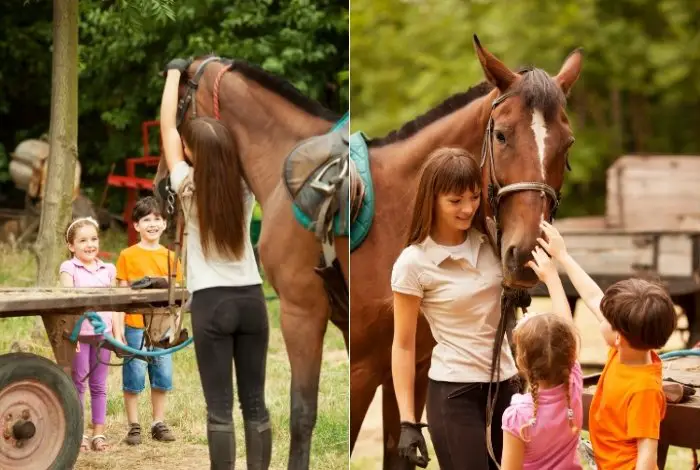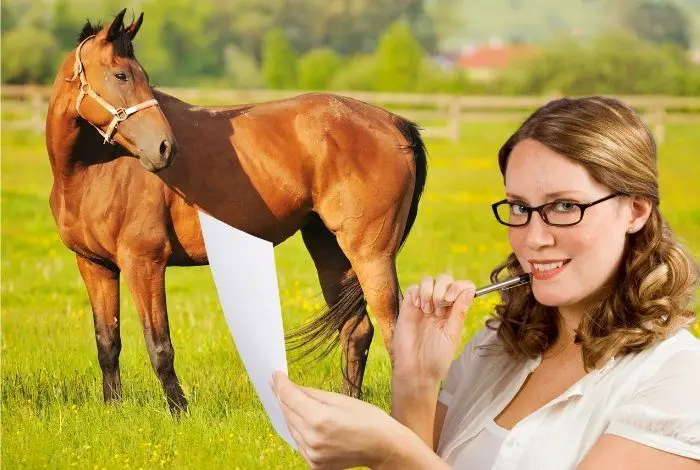

Leasing is a great option for both seasoned and new horse owners alike. For a multitude of reasons, purchasing a horse might not be an ideal option at this point in your life. But even without the commitment of purchasing a horse, leasing can still be a large expense and major obligation. If a possible lease is in your future, check out these 8 important questions to ask when leasing a horse!
When leasing a horse, it is not just a case of finding a horse you like and taking it home. The world of horse leasing can be a minefield, and you’ll need to think carefully before entering into a lease agreement. So, whether you’re considering leasing out your horse, or are looking into the logistics of leasing a horse for beginners, here are some of the key areas to think about.
Although this seems like an obvious one, it is important to ask yourself why you want to lease a horse. Thoroughly understanding the motive behind a lease will help you determine what type of lease will best suit you. There are many different types of the lease agreement, and the option you go for will depend on what you want to use the horse for.
Some riders may be looking for an “upgraded” show mount for a single show year, while another rider may only be living in the area temporarily and is not in a situation to make a long-term commitment.
Many parents opt for leasing programs (with an option to buy, yes, like a house!) for their children. Your specific needs will help pinpoint the type of horse and contract right for your personal situation.

There are many different lease types, all designed to meet the varying needs of horse owners and leasers. Do you want full access to a horse as if it was your own, with a full lease horse agreement? Or would a partial lease where you can ride two or three times a week suit you better? Maybe you’d like to breed a foal and are wondering if a broodmare lease agreement could be a good option.
A care lease commonly refers to an agreement where the leaser pays all the boarding and upkeep costs for the horse, but does not pay any sort of fee to the owner of the horse. This is also sometimes referred to as an off-site lease or free lease and can be a very cost-effective way of experiencing horse ownership.
Any horse leasing contract should clearly state how any expenses should be split. When negotiating a lease agreement, go into it with an open mind and be prepared to compromise if necessary. It is better to get everything clear right at the start, to prevent issues from arising further down the line.
The main expenses to consider are the daily living costs of the horse – the proportion of this you pay is normally calculated according to how much access you have to the horse. It would be very unfair for a horse owner to expect a leaser to pay all the boarding and feed costs for a horse they can only ride twice a week!
So, if you’re going into a partial lease agreement, the daily living costs will be split between the owner and the leaser. If you are taking on the full lease of a horse, expect to pay all costs incurred, including a comprehensive insurance policy for the horse.
If a major unforeseen health issue arises that the leaser is not responsible for causing, the owner may take care of veterinary expenses or split the cost. This is an important area to pay attention to, especially if there is a major health issue that pops up. It may lead to major vet bills on a horse you don’t own if the contract states all vet bills are split or on the leaser!
When considering the expense of leasing a horse, don’t forget to factor in any lease fee that is payable to the owner of the horse. This fee is effectively a ‘rent’ which allows you to use the horses. Not all horse lease agreements incur this fee, particularly those where you take on the full living expenses of the horse.
A lease needs to have a specific start and end date both parties agree to. If there is a chance you may want to renew a lease or maybe even purchase the horse, this needs to be included in the contract. It can be heartbreaking to fall in love with a horse and not have the ability to buy him/her or renew the lease contract.
Some horse lease agreements have a ‘lease-to-buy’ option. This gives you the chance to get to know the horse over a set period, then buy it at the end of the lease. A lease-to-buy agreement takes many of the risks out of buying a horse but can be a more expensive option if there are leasing fees involved.
It is also important to thrash out what happens if a lease is broken by either party or if something goes wrong. For example, what if your partial lease horse goes lame and you cannot ride it – can you terminate the lease agreement early?

Aside from feed and boarding expenses, there are many other costs involved in caring for a horse. These can include farrier, deworming, grooming products, etc. However, some horses require specialty shoes that may cost hundreds of dollars for each trim.
It is important to clarify from the start what the maintenance expenses are and if they are to be split, or how much they typically total. Some horse lease contracts will also require you to use specific feeds, de-wormer brands, farriers, or vets, for which you will need to budget accordingly.
As with any agreement where finances are involved, it is always advisable to have a contract when leasing a horse. This will help safeguard both the leaser and the owner of the horse, and also protect the welfare of the horse.
There are many sample horse lease agreements available online, but we would recommend paying a small fee and having an attorney review any lease contract before signing. We also recommend both parties sign at a notary for documentation purposes. An attorney can help locate missing information or expense splits, as well as correctional actions.
Even with a leased horse, trial periods can save you a headache later on. Trials will allow you to spend time with a horse on your terms and see if there is a bond or working relationship between a horse and rider. The last thing you want is to sign a six-month lease agreement only to find out that the horse is not suitable for your needs!

Some leases apply restrictions on what the horse can be used for, or are specially tailored to the purpose of the lease. For example, leasing a broodmare for breeding purposes would require additional terms and conditions such as whether the mare can be ridden or not.
It is not uncommon for a horse lease agreement to stipulate that the horse and leaser receive regular lessons with a reputable trainer. This is particularly common when the rider is less experienced and helps prevent the horse from falling into bad habits.
Some owners do not want their horses in competition, while others may only lease out for competition purposes! The contract should clearly address any restrictions on what you can and cannot use the horse for.
If you are an avid trail rider or travel for dressage shows, it’s important to ensure the owner allows travel. Some owners may require an insurance policy to be taken out on the horse if frequently traveling.
Leasing is a big decision! For more information on leasing or the projected costs, click here. If you have friends with horses, be sure to share this article!